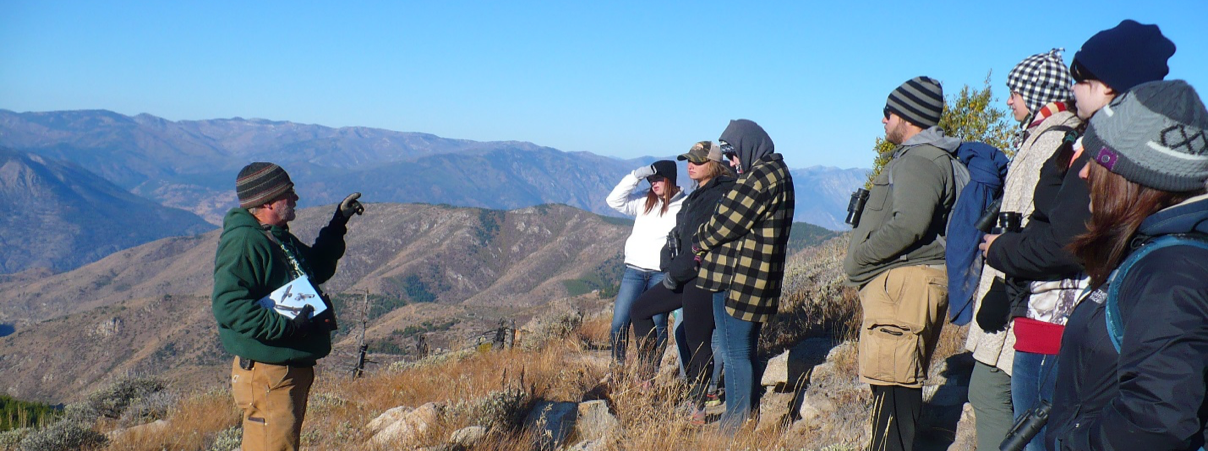
From earth science to ecology, from global change to environmental sustainability, School of the Environment (SoE) undergraduate students master both scientific tools and practical skills that kickstart a meaningful career in a rapidly changing world.
The SoE experience does not stop at the doorway of the classroom or laboratory. Our students engage in research, outreach, professional societies, internships, and more to maximize their education.
Welcome from SoE Associate Director for Undergraduate Studies…
Our students earn a Bachelors of Science degree in Earth and Environmental Sciences with a major in:

Earth Science >>

Environmental and Ecosystem Sciences >>

Forest Ecology and Management >>

Wildlife Ecology and Conservation Sciences (pre-vet option) >>
Our students may also earn a Minor in:
- Forestry minor advising sheet (docx)
- Environmental and Ecosystem Sciences minor advising sheet (docx)
- Earth Science/Geology advising sheet (docx)
- Natural Resource Science minor advising sheet (docx)
- Wildlife Ecology minor advising sheet (docx)
- Geospatial Minor advising sheet (offered through Crops and Soils) (docx)
General Graduation Requirement:
- University Common Requirements (UCORE), Writing Portfolio/Qualifying Exam, and Capstone Course.
- Foundation of basic science (biology, chemistry, and/or physics) and math courses.
- Integrated Earth and Environmental Science Common Core (19 – 20 credits)
- Earth Systems (SOE 210 or SOE 250)
- Water Science (SOE 315 or SOE 460)
- Ecology (SOE 300 or BIOL 372)
- Society & Environment (SOE 312 or POL SCI 430)
- Spatial Analysis (SOIL SCI 368)
- Integrated Capstone (SOE 454 or SOE 408)
- Experiential Elective or milestone
- Major Core requirements
- Professional electives
Upon completion of any School of the Environment baccalaureate program students will be able to:
- Use critical and creative thinking to understand, formulate, or apply ethical responses to contemporary issues and challenges associated with global change and life on a dynamic Earth.
- Use scientific methods, quantitative and symbolic reasoning, and decision-making processes as individuals or teams to explore complex environmental issues and analyze problems in the natural and social sciences.
- Understand the foundations of contemporary science, including the scientific method, hypothesis formation and testing, objectivity, and peer review and evaluation.
- Locate, interpret, synthesize, and apply relevant scientific information sources to address information needs for problem analysis and reporting.
- Use technical media as needed and communicate clearly in verbal and written modes as appropriate for public or professional science audiences.
- Expand awareness of self in a global society and effectively engage diverse perspectives, values, and cultures, ranging from local to global, in dealing with environmental and social issues.
- Achieve entry-level expertise in a professional specialty or academic field in the natural sciences while retaining the ability to effectively engage in broader, cross-disciplinary and cross-cultural activities.
Transfer Students
Students planning to transfer to Washington State University should take courses that will meet the 100 and 200 level course requirements in Chemistry and Mathematics, English, Speech and UCORE in the Social Sciences.
Refer to the Community College Transfer Guide for information about transfer credit either by contacting the Admissions Office at (509) 335-5586 for a copy or by visiting the Admissions website.
Contact Academic Advisor
Pullman students:
Alecia Hoene
Webster 1229
509-335-6166
alecia.hoene@wsu.edu
Tri Cities students:
Paisleigh Kelley
509-372-7241
Paisleigh.kelley@tricity.wsu.edu
Elsa Silva Lopez
509-372-7490
esilva-lopez@tricity.wsu.edu
Vancouver students:
Emily Earhart
360-546-9620
eearhart@wsu.edu